
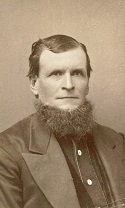 My GG Grandfather Mark Haviland (myself - Kevin Allec -
Vera Haviland's grandson; Vera Haviland - Mark Haviland's granddaughter) was
born in Danville, Vermont, July 3, 1829, according to family records. We have
little to information about his childhood, his other family members or how he
came out west. But starting in March of 1864, until his death in 1894, he was a
very active member of the communities around Paradise Valley, Nevada.
During this time he was mentioned in over 100 articles. He was the voter
register for Paradise Valley, Justice of the Peace, County Assessor, and farmer,
husband, and father.
My GG Grandfather Mark Haviland (myself - Kevin Allec -
Vera Haviland's grandson; Vera Haviland - Mark Haviland's granddaughter) was
born in Danville, Vermont, July 3, 1829, according to family records. We have
little to information about his childhood, his other family members or how he
came out west. But starting in March of 1864, until his death in 1894, he was a
very active member of the communities around Paradise Valley, Nevada.
During this time he was mentioned in over 100 articles. He was the voter
register for Paradise Valley, Justice of the Peace, County Assessor, and farmer,
husband, and father.
The photo of Mark W. Haviland was taken by Mosher's Art Gallery, Chicago, Illinois. The original photo is in our family album.
During the early 1860s, Paradise Valley was in the frontier. This was a time before the US Cavalry had a permanent presence and before the railroad. In March of 1864, Nevada wasn't even at state, it wasn't until October of 1864, that Nevada became the 36th state.
The articles below paint a picture of just how wide open and unruly the west was at this time. They were transcribed from microfilm copies of the newspaper pages.
I have always marveled at the pioneer spirit and the true grit it took to come west. I am proud and honored to have family that had the tenacity to come out west. To this day I still have cousins that ranch in the Paradise Valley.
Paradise Valley
Hudson Bay Company's Peter Skene Ogden traversed Paradise Valley November 1828. Settled in 1863. Indian trouble started the next year causing the establishment of Camp Winfield Scott (1866-70) four miles from here. Paradise Valley was the produce center for nearby Nevada and Idaho Territory mines.
In the original town of Scottsdale (1866), John C. Kemler built the first hotel. Now used as a residence. Renamed Paradise City (1869). The town was a mining supply center: 1878-1920. Later when livestock raising predominated, the town was again renamed. This time "Paradise Valley."
Mark Haviland reports that he will harvest 30-40 acres of barley and potatoes. The local news this week is about mining and farming. Life and times in Paradise Valley are hard but prosperous.
On the 7th of April 1865, a small party composed of W.R. Usher, Fox Jesse, M.S. Bonnifield, Col L. A. Buckner, and John Woodward, left Unionville for a reconnaissance of a portion of the Honey Lake road. They overtook and joint another party, thirteen men from the settlements along the river out on the same mission. On the 9th, the party reached Granite Creek Station, 85 miles from here, owned by Andrew Leech and Lucius Arcularius.
Arcularius had been killed by Indians at Wall Springs, a month ago, and Leech was here for authority to act as Administrator. The house, furnished with five guns and a good supply of ammunition had been left in care of A.J. Curry, Cyrus Creele, and Al Simmons.
On April 1st a large column of smoke was seen rising from the vicinity, and the supposition was that the station was attached by Indians. The walls of the house occupied by the men were built very thick, of sod. They had made ten loop holes, for their rifles, on the side attacked. The attack was made from a stone corral about 30 paces off, in front of the house. The whole front of the corral was found spattered with lead of bullets fired from the house. By the appearances the fight could have last half-a-day. A man was found dead in the house, he appeared to have been shot through the loop hole. A person acquainted with Curry identified him. Curry's body was missing both legs below the knees.
The Indians must have exhausted their ammunition, for they fired long missiles before leaving, made from screw ends of wagon bolts, cut about an inch long and partially smoothed. Two of these were found: one in a bellows near the house, and the other planted two inches deep in wood. Near the lodging place of the latter was a blood stain that killed a dog belonging to the place. A savage animal but intolerant of Indians, his skin was tanned but left on the ground.
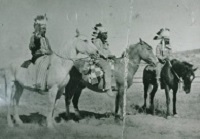 The Indians gained possession of a store-house, adjoining the dwelling, by
tearing out a wall. This enabled them to reach and set fire to the roof. It
appears that Creele and Simmons resorted to flight in preference to burning.
Creele struck out across the flat towards Hot Springs. The flat is of alkali,
very wet, and the tracks are left plain. Three Indians, two on horses and one on
mule, pursued and captured him. They brought him back near the house and burned
him to death. A large portion of skull and jaw-bone were found near the ashes.
At one point where the arms would have been, were large rocks piled up,
everything indicating that he had thus weighted down; and a large pile of sawed
lumber was built up over him, stubs of lumber still remaining partially burned
when these marks where found, and the poor fellow thus burnt up.
The Indians gained possession of a store-house, adjoining the dwelling, by
tearing out a wall. This enabled them to reach and set fire to the roof. It
appears that Creele and Simmons resorted to flight in preference to burning.
Creele struck out across the flat towards Hot Springs. The flat is of alkali,
very wet, and the tracks are left plain. Three Indians, two on horses and one on
mule, pursued and captured him. They brought him back near the house and burned
him to death. A large portion of skull and jaw-bone were found near the ashes.
At one point where the arms would have been, were large rocks piled up,
everything indicating that he had thus weighted down; and a large pile of sawed
lumber was built up over him, stubs of lumber still remaining partially burned
when these marks where found, and the poor fellow thus burnt up.
Simmons took to the road leading to Deep Hole Station. He ran about 30 or 40 rods and there the mark of a pool of blood denotes that faired quite badly having been shot down. The body was dragged off a short distance and much mutilated. The remains of all the men, such as were found, were buried by this party on the 9th.
The party made further observations. The place with all its property had not been worthless than $400 all was burnt. A large wagon destroyed the spokes being sawed out of the wheels. A large lot of good lumber piled on hay stacks and fired.
There is a sorrow ripening for the red skins and it is know that all tribes furnish bucks for these marauding parties, the conviction is gain ground that it is not good for the country to encourage the breeding of Indians. Men who have lost their friends at the hands of these miscreants promise and early and fearful vengeance.
Photo from the Buckingham Family Album for more information go to Buckaroos in Paradise Collection at the Library of Congress - Buckaroos in Paradise Collection at the Library of Congress.
Haviland, in Paradise Valley, has a large tract of arable land, which under favorable circumstances, would soon develop into one of the best farms in the State. As things are now, the prospect of such development is remote. Late this season, he sowed barley on 16 acres of sod, merely turned over. Of 3 acres yielded at the rate of 80 bushels to the acre, a wonderful rate. The entire crop turned out a little short of 60 bushels to the acre. The spots on this globe where such crops are produce are few.
Haviland and other settlers are annoyed and alarmed by the daily appearance of Indians from the north who begin to make themselves entirely to fresh. Lately, bands of these Indians have been seen lighting their fires on every hill top about the valley. The soldiery at Dun Glen is too small in numbers now and additions ought to be in the making instead of depletions.
Dear Register: It does not of necessity follow that all are happy who go to or dwell in Paradise. Flies may bite, rivers and creeks may overflow or dry up and Indians may be hostile -- steal stock and kill citizens. The first of evils annoys yourself and horse; the second damages your crops, and heard much talk about the third. I have experienced the first, saw some evidence of the second, and heard much talk about the third. If you come to Paradise, come armed; not alone, with the panoply of truth and virtue, but like a border warrior, prepare to resist anything hostile -- for the citizens of the valley are apprehensive of danger from Indians. It is hardly considered safe to be alone on a ranch without a pistol strapped to your side or a rifle near at hand. To be sure, powder, lead and percussion caps are useful articles with gun or pistol but not always necessary in order to quit one's nervers.
Photo from the Buckingham Family Album, photo caption " Long
Charlie"
The following letter we received from a citizen (M. W. Haviland) of Paradise Valley, a few days ago:
Indian Creek Ranch, August 21, 1866
Editor
Register
Dear Sir: On Sunday night last, August 19, the Indians
surrounded my house, situated at the head of Paradise Valley. They made a very
bold move surrounding the house, in large numbers, and advancing with in six
feet on all sides. They immediately took possession of a fine saddle, some
clothing and other property hanging within 20 feet of the house. Before we could
bring guns to bear on them they dodged into the brush. Shortly after this they
made a dash on the stock in the corral, rushing every animal out - 18 head. Mr.
Hoytand and myself started in pursuit of the cattle and overhauled them about
two hundred yards from the corral. It being quite dark, we could not see much;
but on overhauling the cattle the Indians gave way, and with some difficulty we
succeeded in gaining the corral, with assistance of Mr. Gustin and Mr. Muffler,
the latter having been left to guard the house from entrance by the Indians.
After getting all the cattle into the corral, and securing them, everything appearing quiet about 2 o'clock in the morning, I started for the soldiers camp, to get help, if possible, to follow the Indians. There being 8 soldiers stationed at the camp and part of them away at that time, I was only able to get four, the Sergeant among the number. I arrived at home with the soldiers about daylight. It was thought from the "sign" about the house that our party was not strong enough to follow; and after looking around that 5 horseman had been stationed from the house for the purpose of running cattle, as soon as the party on foot should succeed in bring them within reach; which they nearly accomplished.
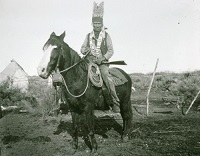 Last Saturday, Chas Adams found an Indian camp at the head
of the valley, on Martin Creek, and had a talk with Indians. They said they were
good Indians, and would like to work, and they gave the name of nearly every.
Last evening Mr. Adams and myself were at the ranchero where these good Indians
were, and found ten willow huts but no Indians. Yesterday morning Mr. Adams and
myself tracked the Indians from my house, a long distance, in the exact
direction of this camp on Martin Creek. I anticipate another attack, and may not
be so lucky next time.
Last Saturday, Chas Adams found an Indian camp at the head
of the valley, on Martin Creek, and had a talk with Indians. They said they were
good Indians, and would like to work, and they gave the name of nearly every.
Last evening Mr. Adams and myself were at the ranchero where these good Indians
were, and found ten willow huts but no Indians. Yesterday morning Mr. Adams and
myself tracked the Indians from my house, a long distance, in the exact
direction of this camp on Martin Creek. I anticipate another attack, and may not
be so lucky next time.
We are very exposed here, as we are few in number and scattered over a distance of 25 miles. The Indians have a great desire to hold this valley as it is fine fishing and hunting ground in the heart of Indian country. There are at present, eight soldiers here; who say they are to remain till after harvest. That is too small a number to be of any use in fighting Indians. We have had several times the promise of protection here from the head officials, but see no prospect of it. We have had troops here at intervals, at which times parties have been induced to invest their all in the enterprise of farming, and by the withdrawal of troops these parties were left at the mercy of the savages.
This valley has been shamefully neglected for so fine a farming country. The importance is evident, and many prominent citizens here with whom I have conversed, say they will leave unless the valley is protected.
M. W. Haviland
Elections in Paradise Valley are coming and the registration notice given that the time for registration of names of qualified electors in Precinct #9 Paradise Township will expire 19th October, M. W. Haviland, Registry Agent.
S. B. Worden, at Paradise Valley, writes of a fatal shooting affray. Joshua Morford met Cyrus Abel and they exchanged angry words. Morford drew his pistol and Abel drew his. Both fired and Morford was mortally wounded. Abel gave himself up to Justice Haviland and from the evidence it appeared he acted in self defense and was discharged.

In Paradise Valley a shooting affray occurred in the upper end of Paradise Valley between M. W. Haviland and John Ragsdale. Henry rifles were used and several shots were fired but nobody was hurt.
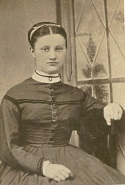 14 Aug 1869 Humboldt National Page 2:4
14 Aug 1869 Humboldt National Page 2:4Paradise Valley. Marriages. At
Batavia, New York, on the 25th, ultimo, Mr. Mark W. Haviland, of Paradise
Valley, Nevada, to Miss Ellen Palmer, of Batavia.
[Ellen Haviland photo
taken by Mosher's Art Gallery, Chicago]
Mark Haviland, while hunting for stock with Wash O'Neal in the mountains west of Paradise Valley, had his arm broken by being thrown from a horse. Dr. Seymour reduced the fracture.
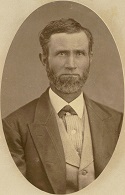 09 Jul 1875 --- Philo Palmer
09 Jul 1875 --- Philo PalmerParadise Valley. Farming. Wheat. Barley.
P. M. Palmer sends a specimen
of Paradise wheat and barley. Stocks over five feet long and the heads are large
and well filled.
[Philo Moe Palmer photo taken by Winnemucca Tandy & Cook Photographers]
N. W. Webster, of this place, was arrested and his premises searched for petit larceny in the alleged stealing of potatoes from Mark Haviland, in Paradise Valley. This was another instance of endeavoring to settle private troubles at the county's expense. Defendant acquitted and costs of the prosecution taxed against Haviland. Will amount to between two and three hundred dollars.
Topics: W. DISEASES. Scarlet Fever. NEWSPAPERS. Silver State. Paradise Valley Body: Aleck Middleton in Winnemucca from Paradise Valley and informs 'Silver State' that scarlet fever is still raging in the Valley and Mrs. Mark Haviland has it now.
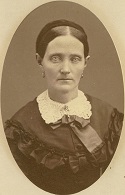 10 Dec 1875 --- Mrs. Phil Palmer
10 Dec 1875 --- Mrs. Phil PalmerParadise Valley. W. PHYSICIANS. MEDICAL CARE Dr. Hutchins was again called to Paradise Valley to attend to Mrs. P. W. Palmer who has been seriously ill for some time. People of Paradise seems to be unfortunate of late in the way of sickness.
[Janette (Keyes) Palmer photo was taken by Winnemucca Tandy & Cook Photographers]
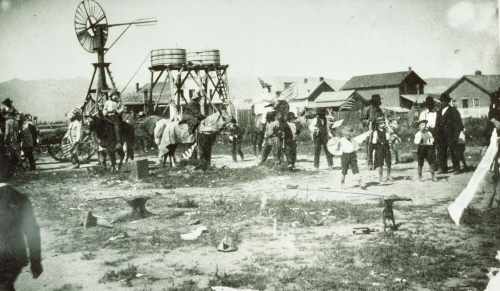
[Photo from the Buckingham Family Album, photo caption "July 4, 1884"]
M.W Haviand died at Paradise last Monday. He was an old resident of Humboldt county and was elected Assessor of that county in 1886. He was engaged in farming in Paradise Valley in early days and of late years since the death of his wife, resided at Spring City, where he served several terms as Justice of the Peace. He was an honest and honarable man.
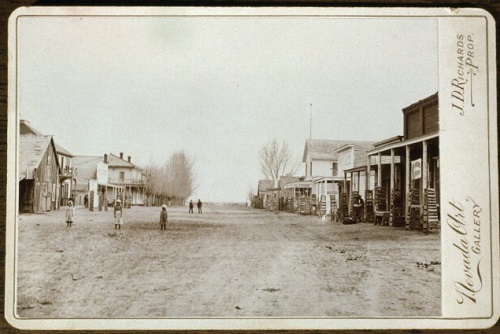
Photo from the Buckingham Family Album, photo caption "Main St 1899"
Mrs. Janette Palmer was born in Middletown, New York in 1827, being in her 83rd year and departed this life May 22, 1910. Her maiden name was Keyes. When three years of age her father, David Keyes moved with his family to Michigan. Mrs. Palmer united with Episcopal church at Athens Michigan, when but 14 years of age. She was a student of Albion college several years, Mrs. Clinton B. Fisk, still survives her. At 21 years of age she was united in marriage to Philo M. Palmer. They lived in perfect harmony until her husband's decease in 1903, since that time she has resided with her son, David Palmer in Paradise, her daughter, Mrs. Emily Shelley in San Jose, and the last two years with her grandson, Mr. C.E. Haviland, in Winnemucca.
Calm and content, in spite of much suffering, in the joyful hope of eternal life, her presence was a daily bendiction in each of these homes.
The surviving members of her family are her son, Mr. David Palmer, her daughter Mrs. Emily Shelley, three grandsons, Mr. C.E. Haviland, Dr. Robert O'Neal and Willmore Palmer, her four great grand childred Harold, Vera, and Dorothy Haviland and Jessica O'Neal.
Mark W. Haviland
Ellen E. Haviland
Philo & Janette Palmer
Contributed by Kevin Allec kevin_allec@hotmail.com
Humboldt County NVGenWeb Copyright